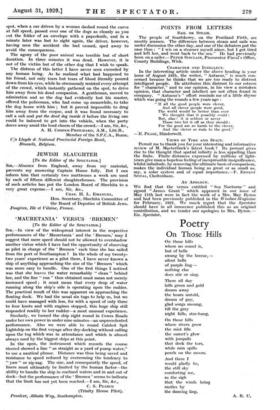POINTS FROM LETTERS SAIL OR STEAM.
The people of Scarfskerry, on the Pentland Firth, are mostly seamen. The difference between steam and sails was under discussion the other day, and one of the debaters put the case thus : "I wis on a steamer mysell aince, but I got tired and left her, and went back to the sea." He had previously been on a sailer.—Pormt StxcLAIR, Procurator Fiscal's Office, 'County Buildings, Wick.
CHARACTER AND INTELLECT.
In the interesting article under the above heading in your issue of August 24th, the writer, " Antaeus," is much con- cerned because he thinks that we are too ready to distrust intelligent people. He attributes this distrust to our esteem for " character " and to our opinion, in his view a mistaken opinion, that character and intellect are not often found in company. " Antaeus's " effort reminds me of a little rhyme which was going the rounds a few years ago :
"If all the good people were clever.
And all clever people were good, The world would be better than ever We thought that it possibly could : But, alas ! it is seldom or never These two hit it off as they should ; For the good are so harsh to the clever.
And the clever so rude to the good."
—E. PEASE, Hinderwell.
VIEVVS OF TIME AND SPACE.
Permit me to thank you for your interesting and informative review of M. Maeterlinck's latest book ? Its perusal gives rise to the thought that spatial infinity is less appalling than The finite. Finite distances expressed by millions of light- years give man a hopeless feeling of inexpressible insignificance, whilst infinitude, by removing the ultimate basis of comparison, makes the individual human being as great or as small as, say, a solar system and of equal importance.—F. ERNEST SPITAL, Cheltenham.
AN APOLOGY.
WE find that the verses entitled "Sea Nocturne" and signed "James Grant" which appeared in our issue of May 11th last were in fact the work of a Mrs. May Byron and had been previously published in the Windsor Magazine for February, 1921. • We much regret that the Spectator should have in all innocence published this as an original contribution, and we tender our apologies to Mrs. Byron.— ED. Spectator.
































 Previous page
Previous page